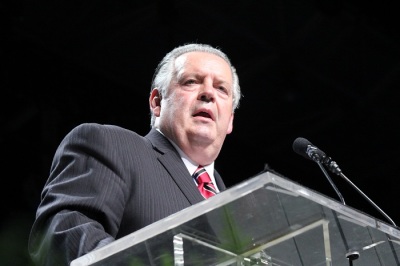Ask Dr. Land: Do we need to rename military bases honoring Confederate leaders?
Question: Do we need to change the names of U.S. military bases that honor the memory of Confederate generals?
The U.S. military needs to change the names of the ten military bases across the South that were named for Confederate generals (the best known of these are Ft. Hood in Texas, Ft. Bragg in North Carolina, Ft. Benning in Georgia, and Ft. Lee in Virginia).

Hasn’t President Trump stated that he will “not even consider” renaming the Army bases in question. Yes, he has. The President has declared “these monumental and very powerful bases have become part of a Great American Heritage, and a history of Winning Victory and Freedom.”
Unfortunately, the President is wrong, and he needs to reconsider his decision.
Please allow me to preface my explanation of why the bases need to be renamed with some personal background that I bring to this discussion. I will leave it to you, the reader, to decide whether this “background” should be seen as positive, negative, or just explanatory, considering the question at hand.
I have approximately a dozen ancestors who fought on each side of the Civil War. This heritage is based on the fact that my father’s family immigrated to Virginia from England in 1636, and my mother’s family came from England to Boston in the 1650s. My mother was from Boston, and my Dad was a fifth generation Texan. There are no regions of the country that are more proud of their historical heritage than Boston and Texas. So I grew up with a steady diet of history from two differing family trees’ perspective. This extended to politics. My mother (“rock-ribbed” Republican) and my father (“yellow dog” Democrat) cancelled out each other’s vote in every election the entirety of my childhood and adolescence.
When I went to college, I wrote my senior thesis at Princeton on “the Slavery Crisis,” “Baptists,” and the “Civil War.” I am very much aware of the significant impact of this heritage on me and of the original sin of slavery on our nation.
Having said that, I still believe that at this point in our history, it is well past time to rename these U.S. military bases. These bases are named in honor of Confederate general officers — men who renounced allegiance to the United States, swore an oath to the Confederacy and took up arms against the government whose bases these are. The fact of these ten bases, located in the heart of what was at one time the Confederacy is divisive, hurtful, and indefensible as well as being just plain wrong.
Now please allow me to address what from experience I am convinced will be the most controversial part of this answer. These generals took up arms against the United States in order to defend slavery. Yes, there were other issues involved, but they all were derived directly from the slavery issue. Without the existence of American chattel slavery in the Southern states, there would not have been a Civil War.
How anyone can doubt this is, frankly, difficult to comprehend. People say to me, “what about states’ rights?” What was at issue was a state’s right to perpetuate Negro slavery. The Constitution of the Confederate States, adopted March 11, 1861, spells this out in unambiguous language in Article IV, Section 3 (3):
In all such territory the institution of negro slavery, as it now exists in the Confederate States, shall be recognized and protected by Congress and by the Territorial government, and the inhabitants.
Granted, these bases in question were mainly opened in the first decades of the 20th century where there was still lingering rancor and dissension from the Civil War. Naming these federal bases located in the South after Confederate generals was no doubt an attempt to bring about national healing and reconciliation at least between white Southerners and Northerners (at that time the U.S. military was strictly segregated, a moral stain on our country that was not remedied until 1948 by President Truman).
So, let’s grant that perhaps the original naming of these bases after Confederate generals was motivated by a spirit of national reconciliation.
Now, we thankfully live in a different, better, more inclusive country, where a different kind of reconciliation is needed. Our U.S. military has led the way in many ways in bringing about racial reconciliation in our nation. That is one reason why African-Americans make up 22% of the Army’s ranks while representing just 13% of the American population.
Imagine how those black soldiers and their families and loved ones must feel residing on, and training at, military bases honoring men who fought to maintain the enslavement of their ancestors. Such a circumstance is immoral and repugnant.
Frankly, I did not know until this week that these bases were named for Confederate generals. Did I know we had military bases named Hood, Lee, Benning, and Bragg? Yes! Did I know there were Confederate generals named Hood, Lee, Benning, and Bragg? Certainly! Did I make the connection between the two? No, I did not. I don’t think most Americans did.
Now we know, and with knowledge comes responsibility. It is well past time that in the spirit of reconciliation with our African-American fellow citizens we rename these bases and cease and desist from needlessly offending our fellow citizens who are serving our country and defending everyone’s freedom.
Dr. Richard Land, BA (magna cum laude), Princeton; D.Phil. Oxford; and Th.M., New Orleans Baptist Theological Seminary, was president of the Southern Baptists’ Ethics & Religious Liberty Commission (1988-2013) and has served since 2013 as president of Southern Evangelical Seminary in Charlotte, NC. Dr. Land has been teaching, writing, and speaking on moral and ethical issues for the last half century in addition to pastoring several churches.




























